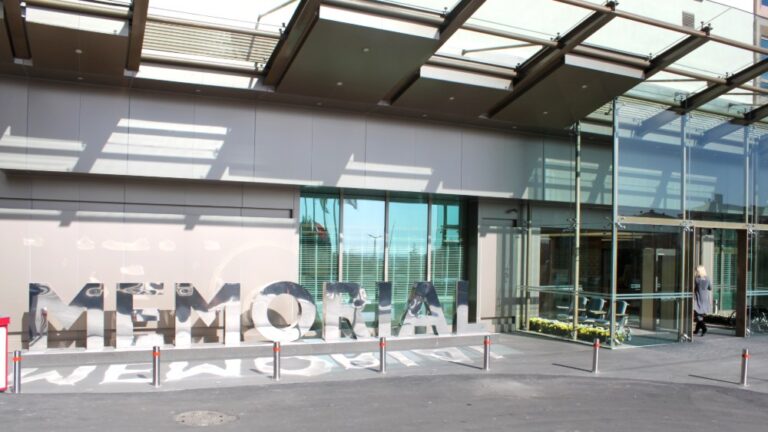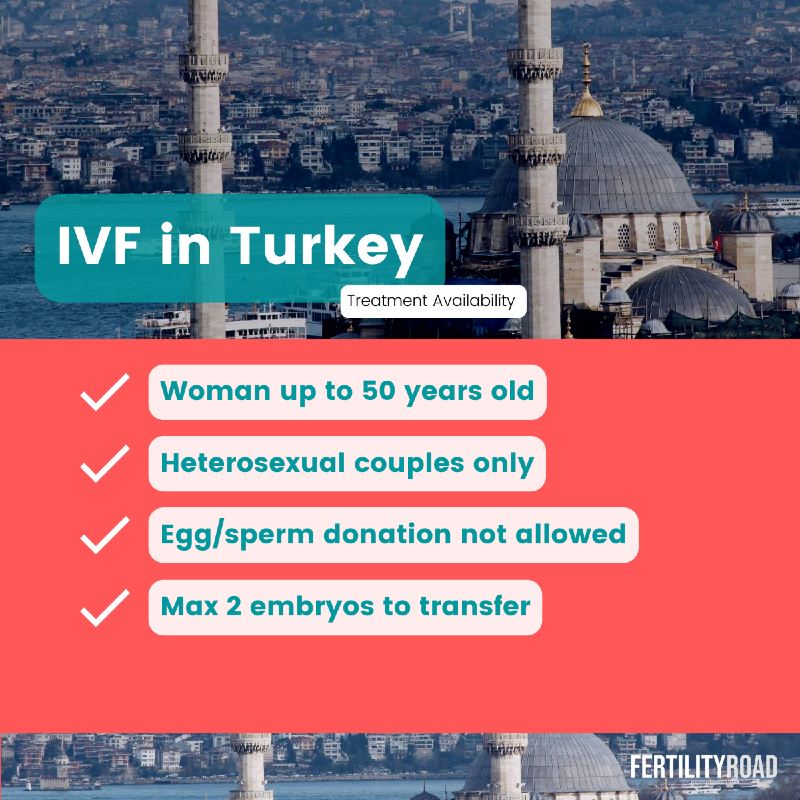
Memorial Hospitals Group
IVF Treatment Availability at Memorial Hospital About Memorial Hospital Founded in 2000, Memorial Hospitals Group is a leading healthcare provider
We analyse your needs, treatment type, destination preferences and find top IVF Clinics for you.

Turkey is a popular destination for IVF treatment, and there are a few things that make it a good option.
It’s one of the most affordable destinations for anyone seeking IVF treatment with their own eggs. Turkey also has high-quality medical staff, including experienced doctors and embryologists.
There is also a lot of choice when it comes to IVF clinics. There are about 140 IVF clinics in Turkey, and 20 to 30 of these provide IVF treatment for international patients. You will find most of the clinics located in the larger cities of Istanbul and Ankara.
These are beautiful cities and perfect destinations for a holiday. Turkey also has a stunning coastline with many coastal resorts, so you could combine your IVF treatment with a relaxing holiday.
With prices much lower than in many other European countries, combined with the fact that it is a popular tourist destination, Turkey could be a great choice for your IVF treatment abroad.
To receive IVF treatment in Spain, there is a maximum age limit for women of 50 years old. However, there is no age limit for men.
IVF is available for heterosexual couples, but it is not available for either male or female couples. And while single women are able to receive treatment, this is limited to egg freezing.
For HIV-positive patients, if the female partner is HIV positive, treatment is not available. However, treatment is available where the male partner is HIV positive. HCV and HBV patients can receive IVF treatment in Turkey.
IVF using donor eggs is not permitted in Turkey. IVF using your own eggs is permitted, and the maximum number of embryos that can be transferred is two.

If you want to receive IVF treatment using donor eggs, this is not an option in Turkey.
This is because egg donation IVF is forbidden in Turkey, as is embryo donation. The only option for IVF is using your own eggs.
Embryo donation in Turkey is not allowed.
Just as with egg donation, IVF using donor sperm is not permitted in Turkey.

IVF Treatment Availability at Memorial Hospital About Memorial Hospital Founded in 2000, Memorial Hospitals Group is a leading healthcare provider
Double donation (oocytes + sperm) is not allowed in Turkey.
Despite the limitations on IVF using egg and sperm donation in Turkey, it remains a popular choice, partly because of the affordable cost of treatment.
For basic IVF packages in Turkey, the cost of IVF treatment using your own eggs ranges from €2,100 to €3,200. This makes it one of the cheapest destinations in Europe for IVF treatment.
Egg freezing is also available in Turkey, and prices for this start at about €800 and go up to about €1,200.
| IVF costs in Turkey – basic packages | |
| IVF with own eggs in Turkey | €2,200 – €3,200 |
| IVF with donor eggs in Turkey | not available |
| Embryo donation in Turkey | not available |
| Egg freezing (oocytes cryopreservation) in Turkey | €800 – €1,200 |
In addition to the standard costs of IVF treatment in Turkey, there are several add-ons and extra services. These, too, are affordable compared to many other destinations.
In general, a consultation with a doctor costs between €80 and €140, while sperm freezing starts at about €340 and increases to €450.
Embryo Monitoring costs between €100 and €200. Blastocyst culture costs between €100 and €200, and it is included in the basic packages in most clinics.
PGT-A / PGS genetic embryo testing costs between €1,500 and €2,400, while embryo vitrification and storage for one year costs between €350 and €500. Frozen Embryo Transfer (FET) costs between €700 and €900.
| IVF costs in Turkey – other costs and add-ons | |
| Medical consultation (doctor) | €80 – €140 |
| Sperm freezing | €340 – €450 |
| Donor sperm | not available |
| Embryo Monitoring (Embryoscope, Time Lapse, Geri etc.) | €100- €200 |
| Blastocyst culture | €100 – €200 included in basic packages in most of the clinics |
| PGT-A / PGS genetic embryo testing* | €1,500 – €2,400 |
| Vitrification of (remaining) embryos and storage for 1 year | €350 – €500 |
| FET – Frozen Embryo Transfer | €700 – €900 |
Turkey is a popular IVF destination for patients from many countries. The main reason patients choose Turkey for their IVF treatment is the cost. Turkey is a very affordable destination. IVF treatment in Turkey is limited to married couples and treatments where egg donation or sperm donation is involved are not allowed according to law.
It’s also tricky to assess the clinic’s quality in Turkey as access to the national / per clinic data and to the national registry is very limited.
Aleksander Wiecki, CMO, IVF Media Ltd.
Success rates in Turkey are not clear because the country does not report national IVF results to ESHRE. While Turkish clinics do report results to the Ministry of Health, the data is not available online.
As an example, according to the TRABZON PROVINCIAL HEALTH DIRECTORATE, the success rate in IVF treatment in general is “around 38-40%”, giving a general indication of what you can expect.
Turkey is a popular destination for IVF treatment, and one of the reasons for this is that it is a popular tourist destination with great weather, spectacular scenery, a fascinating culture and affordable prices.
But what is there to see in the country? Where’s the best place to stay, and how safe is it? Let’s take a closer look.
Turkey is generally a safe country, especially in the areas popular with tourists. It has a thriving tourism industry, and people are kind and hospitable. The main dangers you will face are petty crime like pickpocketing, just as you would with any popular tourist destination.
Turkey is sometimes in the news for the wrong reasons, including terrorism. The political situation can also be tense. However, the risk presented to tourists is very low. Just stay away from political demonstrations and take standard precautions.
You may have to take extra precautions if you head out into the country and explore areas that are not frequented by tourists.
Turkey is easy to reach from all over the world. This is the country where East meets West, and Istanbul Airport is a major travel hub.
A flight from London to Istanbul lasts about four hours and has an average cost of €280 for a return flight, depending on the time of year. It’s even quicker to travel from Paris and Berlin.
It’s also easy to reach from the USA and Canada. Return flights cost about €900, but you can often find cheaper deals. There are also daily flights from most major cities, and European travellers can often find budget flights with airlines like EasyJet.
Entering Turkey is quite easy for most travellers. UK travellers do not need a visa, and they can enter for up to 90 days in a 180-day period. The same is true for visitors from Spain, France, Germany and other European countries.
U.S. citizens usually require an e-Visa. You can apply online in the United States for a stay of up to three months. This is also the case for Canadian and Australian visitors.
Please note that these are subject to change. Always check the latest requirements before you plan your trip to receive IVF treatment in Turkey.
Turkey presents a few more challenges than some European countries when it comes to travelling around. However, in general, it is quite easy.
It has a large road network and buses are the main form of transportation, both for short and long distances. For shorter distances, a smaller dolmuş or minibus will be the main option. Taxis are often the best option for travelling within towns and cities.
You can fly between cities if the distances are large, and many cities have airports. Alternatively, you could rent a car. However, the rail network is not as developed as other European countries.
You will be spoilt for choice when visiting Turkey for IVF treatment. Istanbul is one of the major treatment centres, and you could easily spend your entire stay here. Highlights include Hagia Sophia Mosque, Topkapi Palace and the Blue Mosque. You can also enjoy incredible dining and there are some excellent hotels to stay in.
Or you can visit other towns and resorts, perhaps enjoying a relaxing beach holiday in Marmaris, Alanya or Antalya.
Some of the country’s highlights include the UNESCO World Heritage town of Cumalıkızık near Bursa, the dramatic scenery of Pamukkale with its white travertine terraces, and the ancient ruins in Demre.

| Cookie | Duration | Description |
|---|---|---|
| cookielawinfo-checbox-analytics | 11 months | This cookie is set by GDPR Cookie Consent plugin. The cookie is used to store the user consent for the cookies in the category "Analytics". |
| cookielawinfo-checbox-functional | 11 months | The cookie is set by GDPR cookie consent to record the user consent for the cookies in the category "Functional". |
| cookielawinfo-checbox-others | 11 months | This cookie is set by GDPR Cookie Consent plugin. The cookie is used to store the user consent for the cookies in the category "Other. |
| cookielawinfo-checkbox-necessary | 11 months | This cookie is set by GDPR Cookie Consent plugin. The cookies is used to store the user consent for the cookies in the category "Necessary". |
| cookielawinfo-checkbox-performance | 11 months | This cookie is set by GDPR Cookie Consent plugin. The cookie is used to store the user consent for the cookies in the category "Performance". |
| viewed_cookie_policy | 11 months | The cookie is set by the GDPR Cookie Consent plugin and is used to store whether or not user has consented to the use of cookies. It does not store any personal data. |